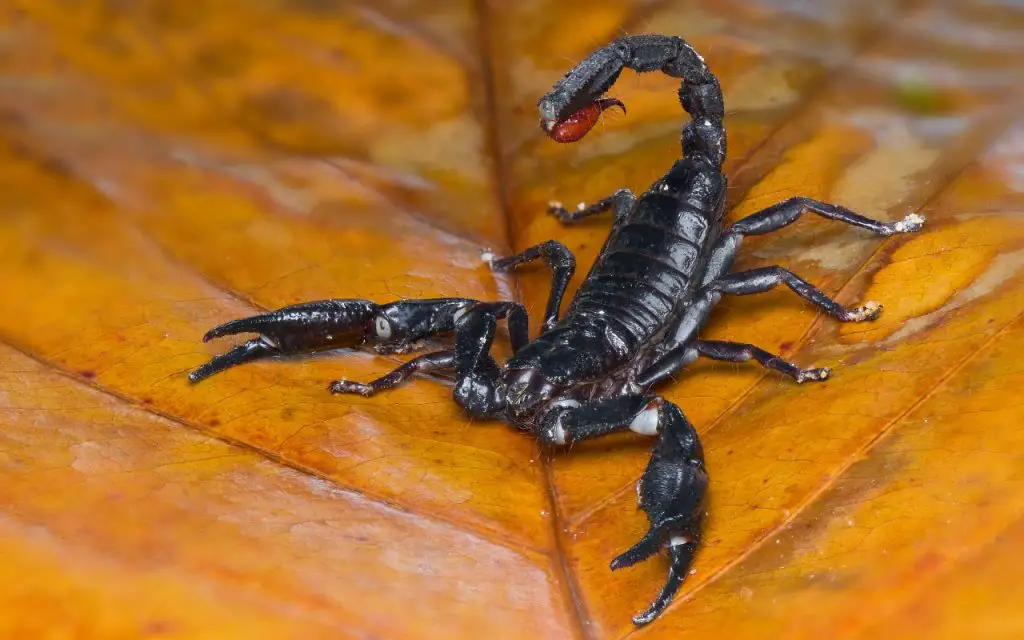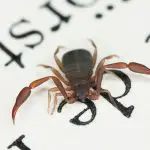Why does a scorpion sting? Well, it’s not for the fun of it, despite what many people say. Keep reading to learn more about how scorpions defend themselves…
Scorpion venom has two purposes. First, to immobilize and kill their prey. Second, to defend against predators. The majority of scorpion stings to humans are for defense. They sting when you step on them, or try to handle them. They also sting if trapped in boots or clothes when trying to hide in them.
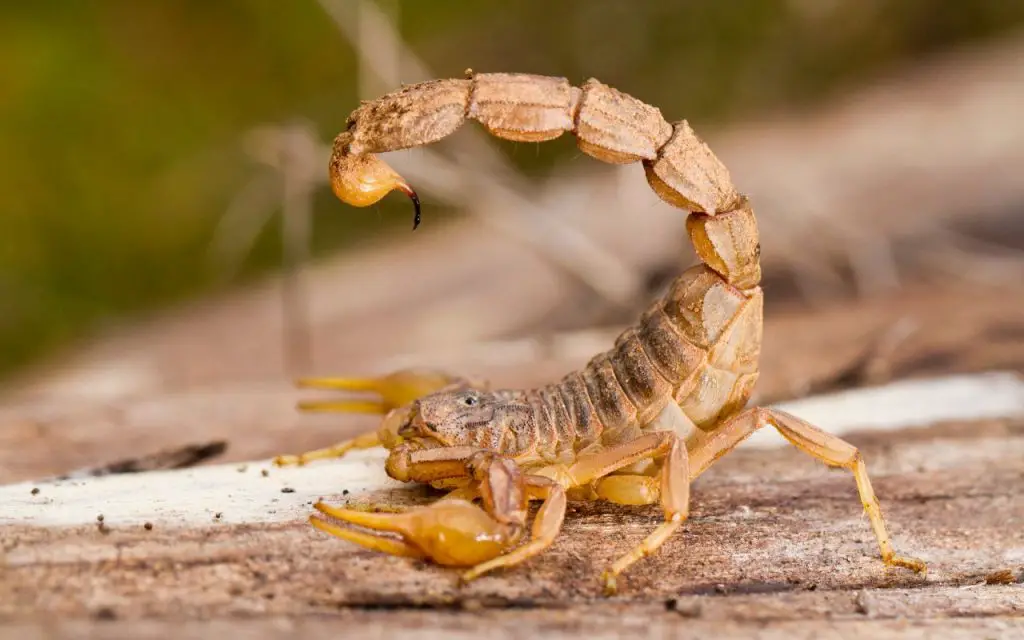
Scorpions have stingers in their tails. This stinger is what is responsible for releasing the venom when a scorpion stings.
A scorpion can sting when they feel threatened or intimidated. Usually, the sting from a scorpion is a defensive reaction, and can be avoided by steering clear of the scorpion.
The intensity of scorpion stings can also change depending on the species of scorpions. Some people experience severe symptoms when stung by a scorpion.
Scorpion venom can feel extremely painful to deal with. Their venom contains a mix of toxins that are complex.
These toxins affect the nervous system when injected into the human body.
What Does A Scorpion Sting Look Like?
When you get stung by a scorpion, it can make the affected area look red as well as swollen. Scorpion stings usually aren’t harmful and the pain only lasts around the area you were stung in.
At the sting site, you could feel a tingling sensation, or sometimes, a burning sensation as well. The biggest indicator that you’ve been stung by a scorpion is the red inflammation around the area you were stung.
Scorpion venom isn’t always harmful. Think about bee stings and spider bites.
A scorpion sting would look similar to what a bee sting or a spider bite would look like. You may be curious as to why scorpions sting.
The answer is that they sting in order to protect themselves.
How Many Times Can A Scorpion Sting?
Scorpion stings can feel painful, and for young children, they can be fatal as well. A scorpion doesn’t just sting once.
It’s common for scorpions to sting at least once, but sometimes, they may sting more than once. How many times they sting depends on how intimidated they feel by the situation.
The stinger, which is located near the tail segment’s end, isn’t usually lost or left behind in the body tissue of a person after they’ve been stung. As long as the scorpion has their stinger, they can keep stinging.
The sting site can feel painful for hours after you’ve been stung by a scorpion.

How Long Does A Scorpion Sting Last?
If you get stung by a scorpion, there usually isn’t anything to worry about. Even if you don’t seek treatment, the symptoms associated with a scorpion sting usually go away within 48 hours of being stung.
But let’s say you were stung by a venomous scorpion. If this happens, then the symptoms of a scorpion sting could develop for around a day, if not slightly longer.
However, this isn’t anything to worry about.
Unless you experience more severe reactions, such as difficulty breathing, you usually don’t need to seek medical attention.
Being stung by a scorpion can affect the nervous system, since neurotoxins are being released into your body. Monitor the site of the sting to gauge how your body is reacting to the sting.
If the wound worsens, consider seeking medical help. When dealing with scorpion stings, it’s important to monitor your symptoms.
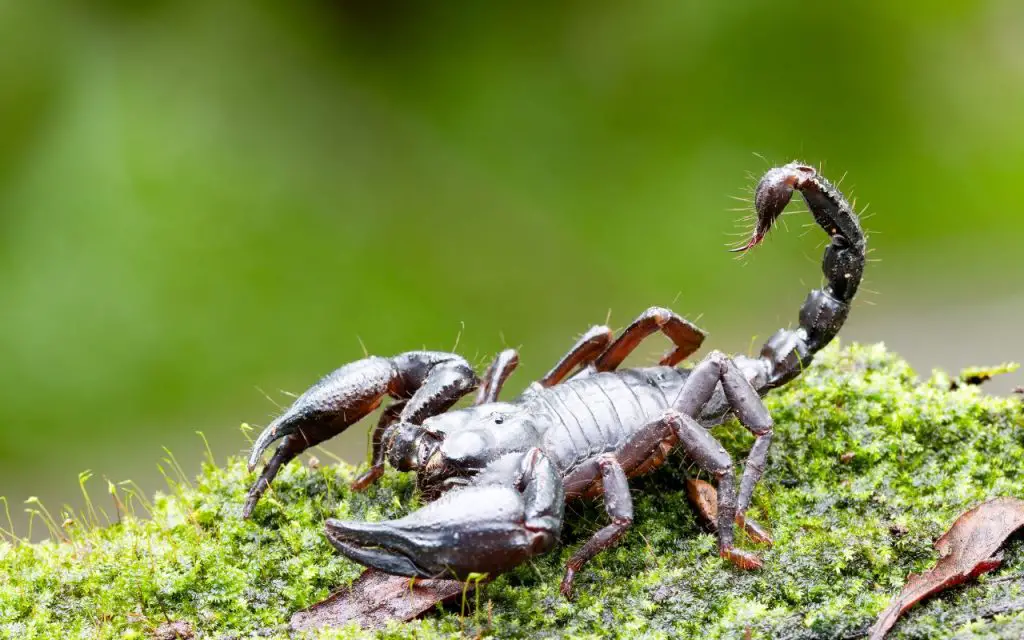
Scorpion Sting Treatment
Usually, scorpion stings don’t require any treatment, However, if you’ve been stung, it may still be a good idea to visit the doctor just as a precaution.
Take for example the New Mexico Arizona Bark scorpion. Being stung by this scorpion could constitute a medical emergency, not just in children, but also in older adults.
If the affected area continues to hurt after being stung by a scorpion, you should visit the emergency department. Anytime you experience severe symptoms after being stung by a scorpion, such as trouble breathing, it’s time to visit the doctor.
Treatment for scorpion stings can include taking sedatives. In case you start to experience muscle spasms, then you may need intravenous medication.
IV can also be required if you’re experiencing severe pain, have high blood pressure, or feel agitated. Scorpion antivenom may also be used, but this is only after careful consideration.
This is due to the side effects of the antivenom, as well as the costs associated with manufacturing it. Scorpion antivenom can be the most effective should it be given before the symptoms start to develop.
If you have trouble breathing or have experienced subsequent stings, then an antivenom may be necessary. A Bark Scorpion sting can be extremely painful.
Scorpions from the Southwestern United States leave behind painful swollen areas should they sting a person. The best way to deal with a scorpion sting is to seek medical help.
It’s a good idea to seek medical treatment should you be experiencing local pain, high blood pressure, muscle spasms, or are at risk for pulmonary edema. There are certain types of scorpions that could cause you to experience respiratory failure.
In such cases, you need to go to the emergency room as soon as possible. Knowing the type of scorpion could be important for poison control.
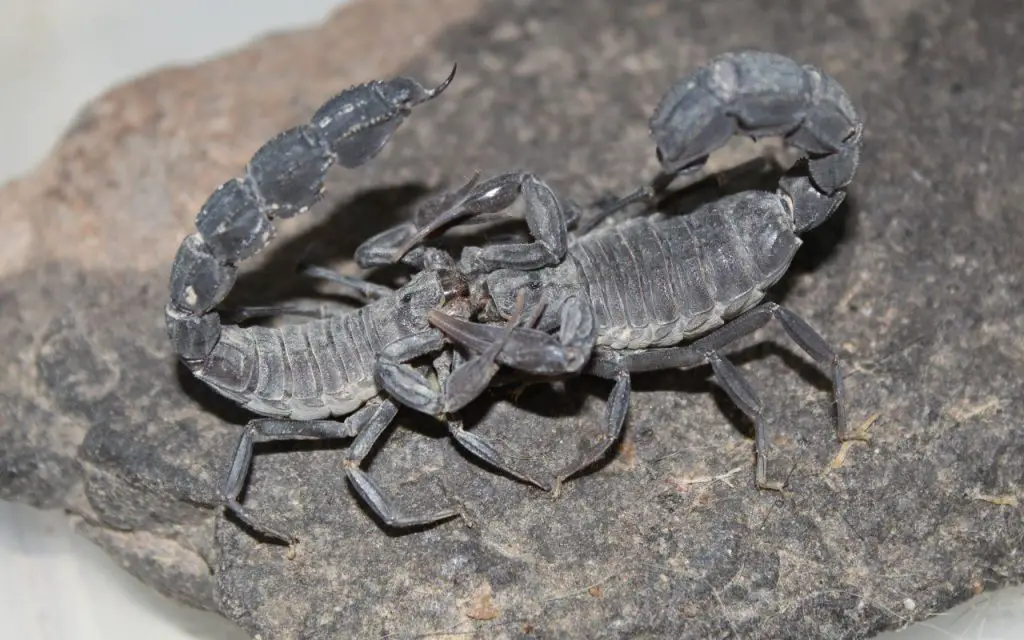
Can You Die From A Scorpion Sting?
People don’t generally die from being stung by a scorpion. The. sting site can feel as if it’s burning, and it can look inflamed as well.
However, in rare circumstances a person may experience an allergic reaction to getting stung. This is known as anaphylaxis and could result in the development of serious symptoms.
Among what you should know about scorpion stings are what symptoms you could experience. So what are the severe symptoms that you could experience from a scorpion sting?
- A feeling of numbness through your body
- Difficulty when it comes to swallowing anything
- Your tongue could become thicker
- Your vision could become blurry
- The eye movements could be roving
- Excessive salivation
- Difficulty with breathing
If you experience any of these symptoms after being stung by a scorpion, then this constitutes an emergency. You’ll need to get medical attention as soon as possible, in order to avoid serious illness or even death.
A venomous scorpion could cause you to have a severe reaction if stung. If you’re experiencing any of the symptoms of a scorpion sting, such as difficulty breathing, seek help immediately.
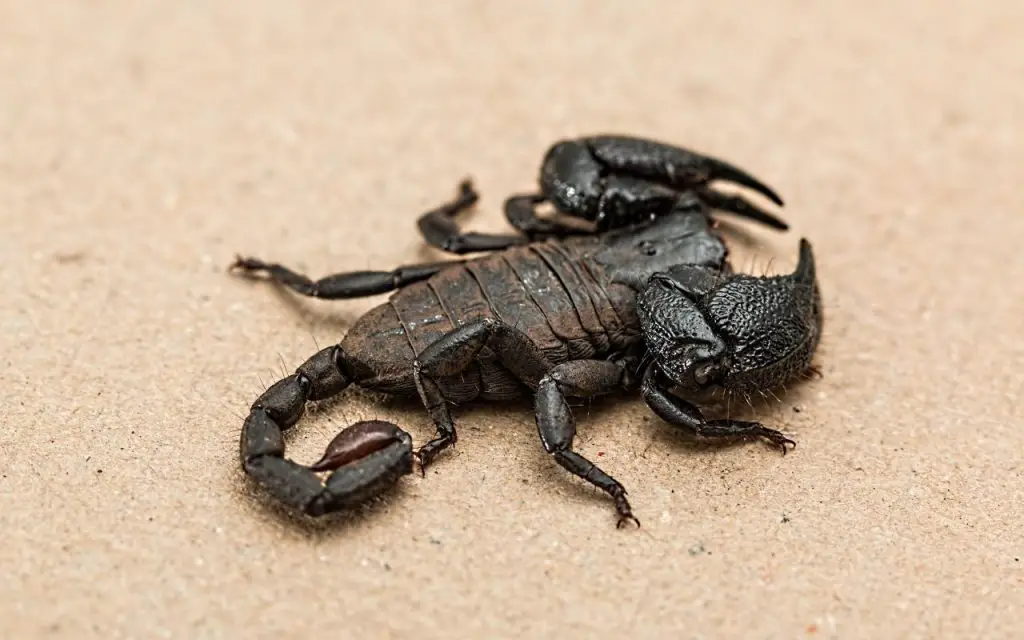
Does Drinking Milk Help With Scorpion Stings?
Most scorpion stings aren’t fatal, but they can be extremely painful. There is a myth that if you drink milk, the pain from your sting should go away.
However, this actually depends on how severe your sting is. There are different grades when it comes to severity.
For pain that is mild, drinking milk can help you deal with the situation. But if the pain worsens then it’s time to seek medical attention.
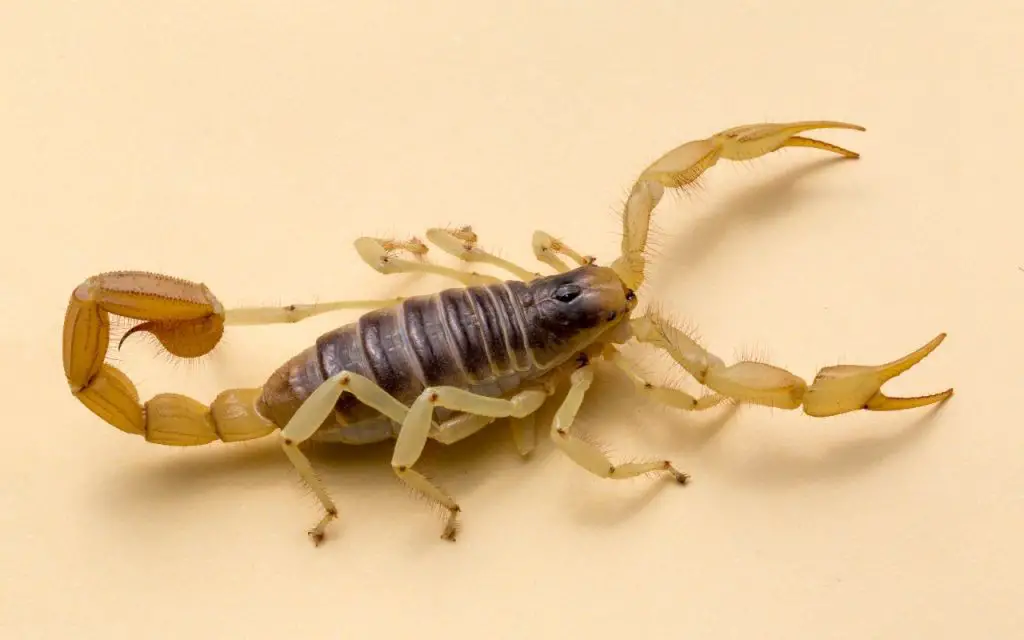
FAQ Relating To Why Scorpions Sting
There are different types of scorpions that can sting you. Depending on what you’ve been stung by, your method of poison control will change.
Centruroides Sculpturatus scorpions can cause you to have painful stings that need professional medical care. If your pain is more than you can take, you may need the help of a cold compress.
A cold pack can make the area feel numb. You could also use UV light to help with your treatment.
In healthy adults however, you usually don’t need to get medical attention. Scorpion envenomation can be painful, but the symptoms usually go away by themselves in a day or two.
If you’re wondering what to know about scorpion stings, then these are the most common questions that people ask about scorpion stings.

What Causes A Scorpion To Sting?
A scorpion can sting you when they feel threatened or intimidated. Usually, upon encountering a human, the instinct of a scorpion is to scurry away.
But sometimes, this isn’t possible. If the scorpion feels threatened or trapped in any way, it could resort to stinging you, as a way to protect itself.
Upon deciding to sting, a scorpion will likely become more aggressive.
What Happens To A Scorpion When It Stings You?
When a scorpion stings you, nothing will usually happen to it. The stinger also stays with the scorpion in most occasions.
Stinging is a defensive reaction that scorpions have developed in order to protect themselves from perceived threats. Although it’s believed that the stinger is deposited in the person being stung, this is hardly the case.
When a scorpion stings, it’s usually to protect themselves. After stinging someone, the scorpion may try to run away in order to secure their safety.
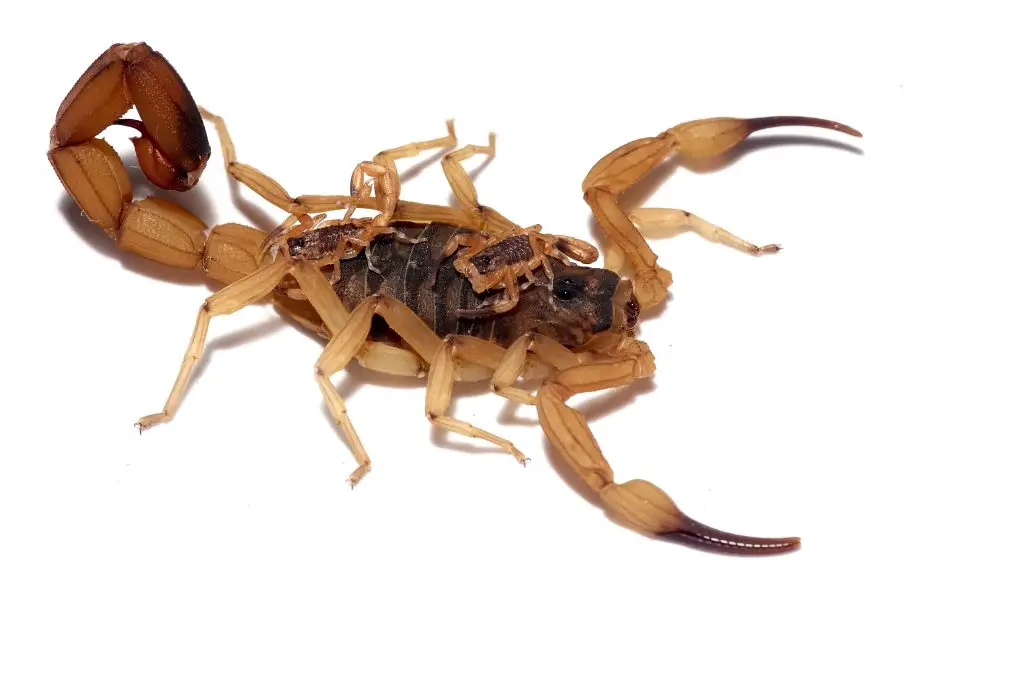
How Long Do Scorpion Stings Hurt?
How long your scorpion sting hurts will depend on a few factors. Usually, the pain from a scorpion sting goes away in 48 hours, but there are times when the pain may worsen.
If you find that your symptoms are getting worse or that the pain is becoming hard to tolerate, then it may be time to seek professional help. This is as there are varieties of scorpions whose sting happens to be more venomous, and as a result, more painful to deal with.
Such pain may not go away by itself, instead requiring medical intervention in order for the situation to be better dealt with. Learning more about scorpion sting facts can help you understand how long scorpion stings hurt for.
Can Scorpions Sting After They Are Dead?
Yes, it’s possible for you to be stung by a scorpion even after it’s dead. This is as they have muscles which are responsible for firing their stings, which could fire off after death.
This is why even if you find a scorpion that is dead, you should avoid touching it. Use a broom and a dustpan to get rid of the scorpion instead.

